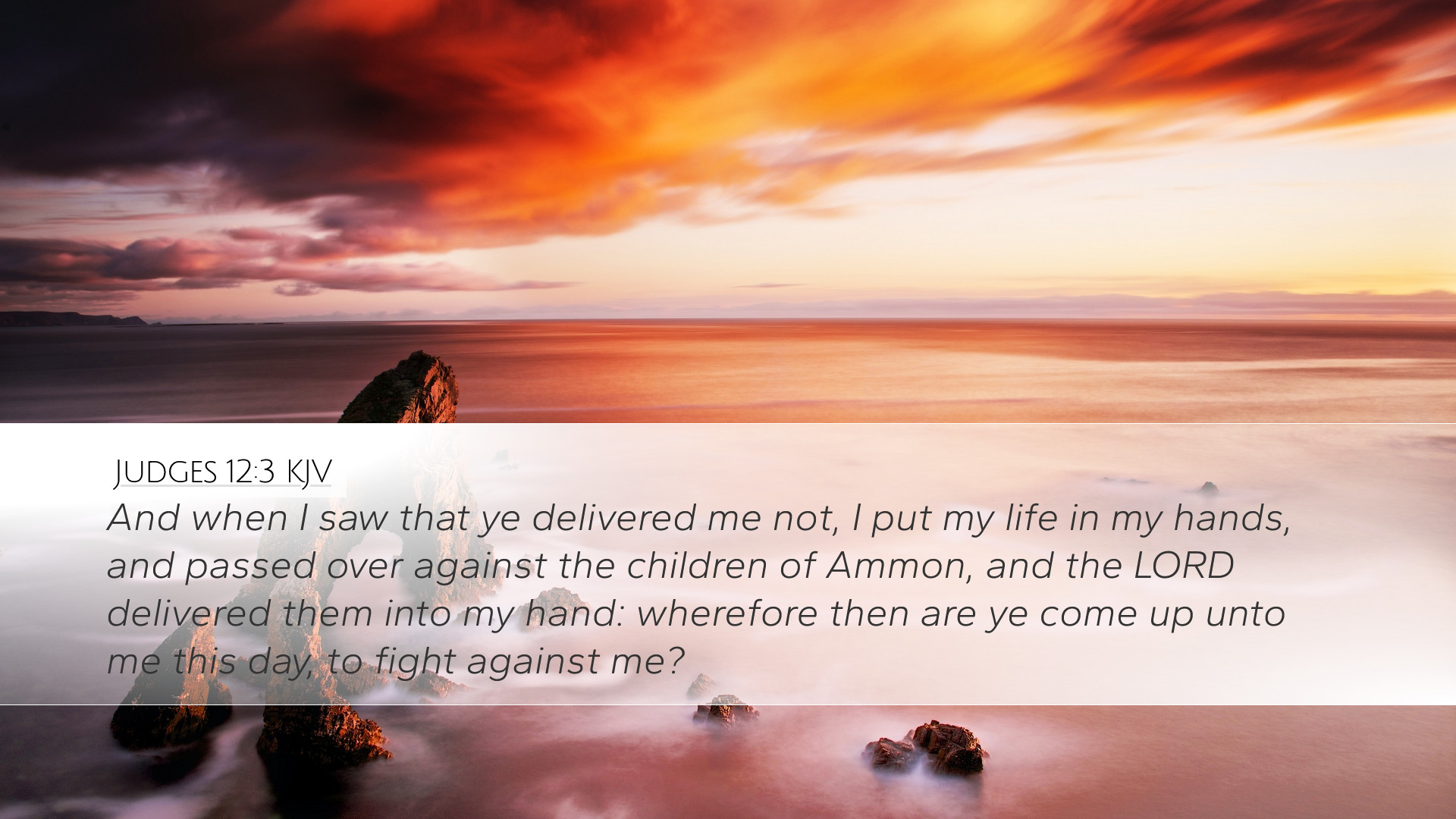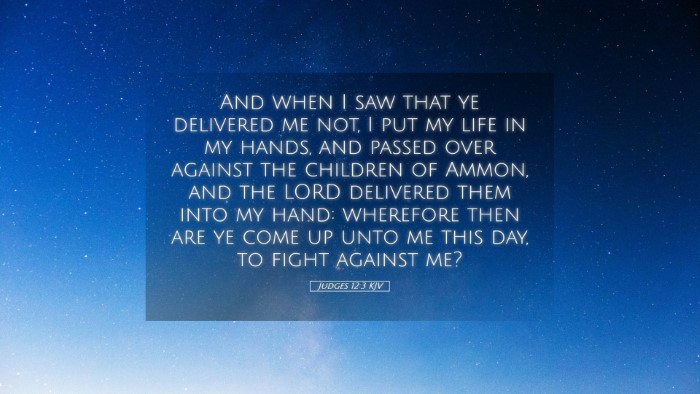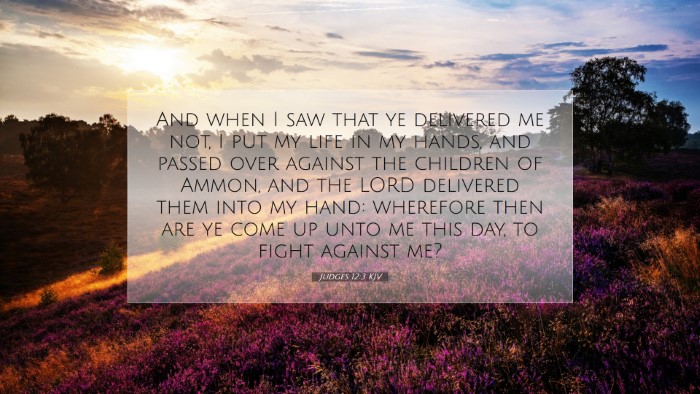Old Testament
Genesis Exodus Leviticus Numbers Deuteronomy Joshua Judges Ruth 1 Samuel 2 Samuel 1 Kings 2 Kings 1 Chronicles 2 Chronicles Ezra Nehemiah Esther Job Psalms Proverbs Ecclesiastes Song of Solomon Isaiah Jeremiah Lamentations Ezekiel Daniel Hosea Joel Amos Obadiah Jonah Micah Nahum Habakkuk Zephaniah Haggai Zechariah MalachiJudges 12:3
Judges 12:3 KJV
And when I saw that ye delivered me not, I put my life in my hands, and passed over against the children of Ammon, and the LORD delivered them into my hand: wherefore then are ye come up unto me this day, to fight against me?
Judges 12:3 Bible Commentary
Commentary on Judges 12:3
Verse Text: "And when I saw that ye delivered me not, I put my life in my hands, and passed over against the children of Ammon: and the LORD delivered them into my hand: wherefore then are ye come up unto me this day, to fight against me?" (Judges 12:3)
Contextual Overview
This passage belongs to a tumultuous period in Israel's history when judges ruled in the absence of a centralized monarchy. Jephthah, a judge and warrior, had been called upon to lead Israel against the Ammonites, who had oppressed them. This verse reflects a turning point where Jephthah addresses the Ephraimites regarding their lack of support and their subsequent confrontation against him.
Exegesis and Key Themes
Several critical themes emerge in this verse that warrant deeper exploration:
- The Weight of Leadership: Jephthah's dilemma illustrates the heavy responsibilities borne by leaders. His statement about putting his life in his hands conveys a sense of personal risk and commitment to the cause of Israel. Biblical leaders often face dire circumstances where faith and action are intertwined.
- Divine Deliverance: The recognition that the LORD delivered the Ammonites into Jephthah’s hands underscores a prevalent theme in the Book of Judges: God's sovereignty and intervention in Israel’s struggles. It highlights the theological understanding of God as a deliverer who raises leaders to secure the redemption of His people.
- Community Responsibility: Jephthah's reproach towards the Ephraimites raises questions about communal support and loyalty during crises. The implication is that the lack of unity among the tribes can lead to internal strife despite shared enemies, emphasizing the need for solidarity in challenges.
Commentary Insights
Matthew Henry's Commentary
Matthew Henry provides a thorough analysis of this passage, pointing out that Jephthah's speech reflects a mixture of disappointment and righteous indignation. He notes that, despite Jephthah being a leader raised up by God, he faced opposition from his own people rather than unification in purpose. Henry emphasizes that God's providence led Jephthah to victory, showcasing God's ability to work through flawed individuals.
Albert Barnes' Commentary
Albert Barnes elaborates on the cultural context of Jephthah’s leadership and the dynamics of tribal relationships during this period. He articulates that Jephthah's challenge to the Ephraimites was both a question of their motives and integrity. Barnes also reflects on the nature of envy and how it often breeds conflict, suggesting that the desire for recognition and status can lead to destructive actions, even within one’s own community.
Adam Clarke's Commentary
Adam Clarke adds another layer of interpretation surrounding Jephthah's actions and their implications. He points out that the phrase "put my life in my hands" signifies extreme personal sacrifice and the weight of spiritual warfare that Jephthah faced. Clarke underscores the notion that real faith involves tangible risk and that in spiritual leadership, adherence to God’s call requires unwavering courage and dedication.
Theological Implications
This verse prompts serious theological reflection regarding divine sovereignty, human agency, and the collective responsibility of God’s people. The interplay of these themes challenges both individual and community levels.
1. Divine Sovereignty vs. Human Responsibility
The assertion that God delivered the Ammonites into Jephthah's hands reveals a core belief in God’s over-arching control over history. Yet, the fact that Jephthah had to rally support highlights that human actions play a significant role in fulfilling God’s purposes.
2. The Nature of Conflict
The confrontation with the Ephraimites represents a stark reminder that conflicts can arise among God's people, even amidst external threats. It provokes reflection on how believers can sometimes act as adversaries within the body of Christ.
Application for Today's Church
For pastors, theologians, and students of scripture, Judges 12:3 serves as a poignant narrative that can inform contemporary ministry and church dynamics.
- Encouragement to Leadership: This commentary encourages leaders to recognize the heavy cost of leadership and to remain steadfast in their commission s despite opposition.
- Unity in Purpose: The need for unity among believers is ever more critical, emphasizing that the body of Christ must work together against common adversaries rather than sow discord among themselves.
- Faith and Sacrifice: The call to 'put our lives in our hands' speaks to the radical commitment expected of believers. This verse challenges individuals to embody faith that is active and courageous in the face of trials.
Conclusion
Judges 12:3 serves as a rich field for theological exploration and spiritual growth. The interplay of leadership, divine intervention, and community dynamics invites a profound reflection on the nature of faith and the essential unity among believers. It calls for a commitment to God’s mission while recognizing the significant role of community in fulfilling that mission. As we navigate through the complexities of faith, this passage provides invaluable wisdom on standing firm in the face of internal and external challenges.


